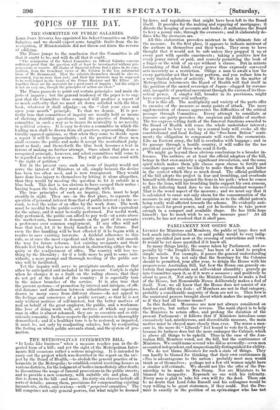THE METROPOLITAN INTERMENTS BILL.
"IT looks like business" when a measure reaches you in the di- gested form of a bill ; and yet the sight of the Metropolitan inter- ments Bill occasions rather a serious misgiving. It is intended to carry out the project which was described in the report on the sub- ject by the Board of Health,—to abolish the general practice of in- terments in the Metropolis; to establish central receiving-houses in various districts, for the lodgment of bodies immediately after death; to discontinue the usage of funeral processions in the public streets ; and to provide a new cemetery, with suitable site and plan. All this is down in the bill—and more. Its sixty-six clauses include all sorts of details ; among them, provisions for compensating existing incumbents, clerks, and sextons—with "perpetual annuities." The bill Comprises not only general powers, but what might be deemed by-laws, and regulations that might have been left to the Board itself. It provides for the making and repaying of mortgages; it directs the keeping of accounts and books ; it authorizes the Board to levy a penny rate, through-the overseers ; and it elaborately de- fines who the overseers are..: All this elaboration provokes mistrust in the ultimate fate of the measure. In the first place, it appears to indicate mistrust of the authors in themselves and their work. They seem to have thought that it would not be safe unless they propped it up at every part with specific enactments ; taking a positive law for every penny raised or paid, and scarcely permitting the beck of a finger or the wink of an eye without a clause. But in minute lawmaking of that kind, every power thus expressly_ conveyed acts inversely as a restriction. Oblige a man to await a law for every particular act that he may perform, and you reduce him to a very limited sphere of activity. We fear that in the matter of Metropolitan interments the Board of Health will find itself in the position of the sacred sovereign of Japan—clogged by ceremo- nial, incapable of practical movement through the excess of its theo- retical power. A simpler bill, broader in its provisions, might have conveyed more real authority.
Nor is this all. The multiplicity and variety of the parts offer to enemies of the measure so many points of attack. _ The mere agglomeration of clauses aggravates the difficulties of the critical passage through Committee. Every attempt to conciliate or reassure one party provokes the suspicion and dislike of another. The too express setting forth of the funereal functions awarded to the Board of Health will rouse the whole undertaker interest ; the proposal to levy a rate by a central body will evoke all the constitutional and local feeling of the "free-born Briton" senti- ment; the obligation to compensate will excite the economists. Like an Eastern army, the bill is overladen with baggage ; and in its passage through a hostile country, it will suffer for the too provident anxiety of those who send it forth.
We might go beyond these obvious conclusions to a broader in- ference. The authors, or at least the official adopters of the bill, betray in that over-anxiety a significant irresolution, and the same spirit which makes them pile clause upon clause to fortify and conciliate appears only too likely to make them flinch and falter in the contest which they so much dread. The official godfather of the bill adopts the project in fear and trembling, and overloads himself with defences against the lions in his path : when he comes to face the lions, will his trembling limbs support his own armour, will his faltering hand dare to use his over-abundant weapons? That is the worst aspect of the measure; and we must say that it is calculated to cause not only alarm for the consummation of the measure in any one session, but suspicion as to the official patron's being really well-affected towards the scheme. He evidently anti- cipates need for great power, and yet he hesitates to take power enough in a compact and available shape. He has little hope himself ; has he much wish to see the measure pass ? At all events, he has not resolved that it shall pass.


























 Previous page
Previous page